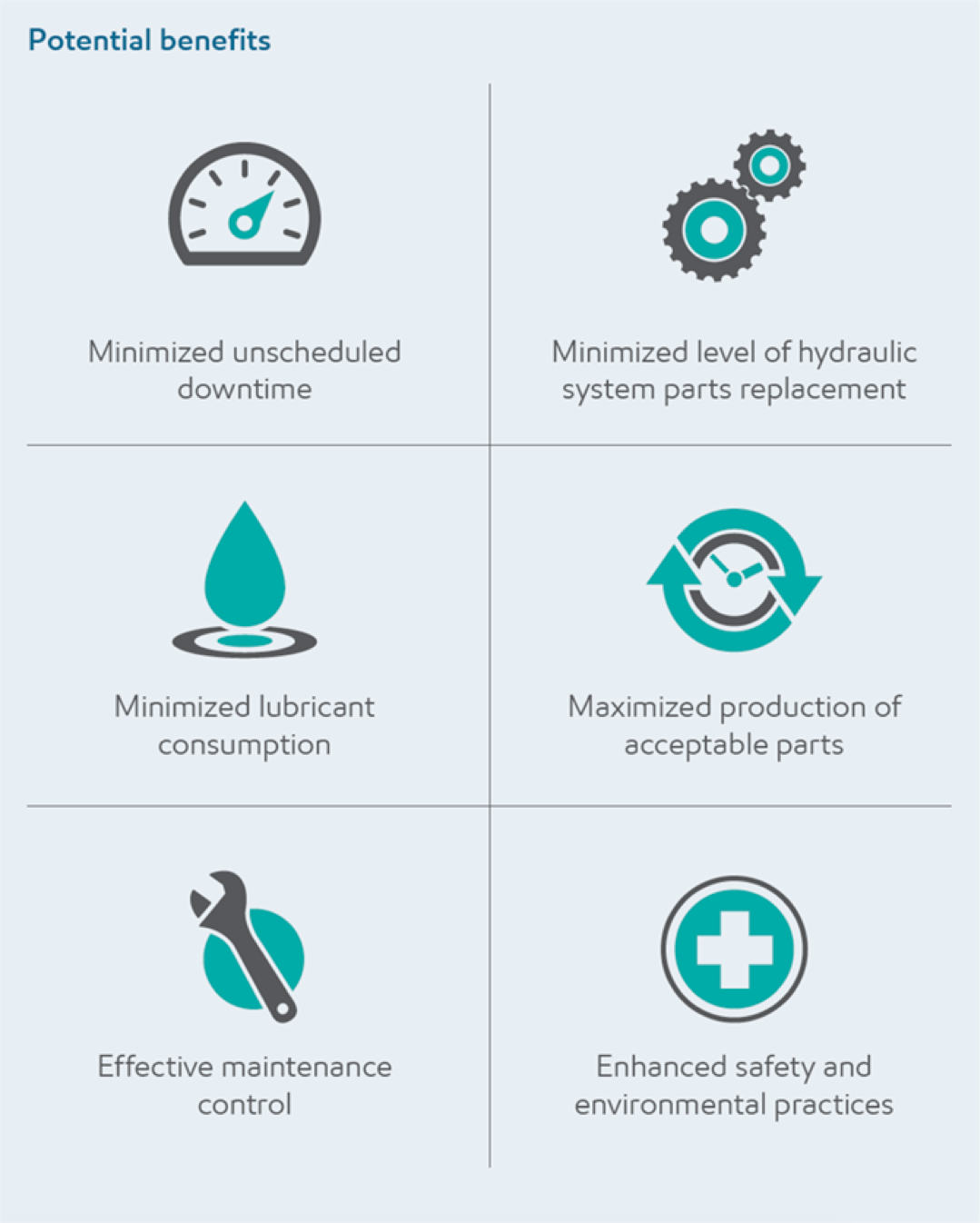
Hydraulic inspection
Get the most out of your critical hydraulic equipment. Discover opportunities to improve the reliability of your hydraulic system.
How it works
Our engineers inspect, report, and document the condition of your critical plant hydraulic systems. Using inspection data, the service establishes the optimum time to replace critical hydraulic components and recommends maintenance practices to improve system reliability.
We work with you to:
- Understand current plant lubrication practices, equipment life, and improvement opportunities
- Schedule periodic hydraulic system inspections
- Inspect components and breather condition
- Record reservoir oil temperatures and obtain system oil samples
- Evaluate system fluid cleanliness levels
- Compare results to identify changes and trends
- Target a set Hydraulic Fluid Index
Actionable insights
We put together an Engineering Service Report to help you make your hydraulic system more reliable. The report outlines the condition of the hydraulic systems inspected, recommended actions, and estimated service value. Our findings will highlight critical issues commonly found in hydraulic systems, such as:
- Contaminated lubricants
- Extreme hydraulic system temperatures or pressures
- Issues with hydraulic oil (aeration of oil, high oil leakage rates, or low oil levels)
- Issues with hydraulic components (restriction in pump suction or hose condition)
- Shock loading in hydraulic systems
- Inadequate filtration or maintenance practices
Safety, health and environment
Our field engineers strictly observe safety and environmental rules, as well as ExxonMobil and customer safety practices. To coordinate this effort, designated plant personnel verify electrical and mechanical lockout and proper tagging prior to working on equipment, and provide recommendations on site safety practices.
Maintain the reliability of your hydraulic system with expert recommendations and insights. Talk to our experts to engage a free hydraulic inspection today.

How it works
Our engineers inspect, report, and document the condition of your critical plant hydraulic systems. Using inspection data, the service establishes the optimum time to replace critical hydraulic components and recommends maintenance practices to improve system reliability.
We work with you to:
- Understand current plant lubrication practices, equipment life, and improvement opportunities
- Schedule periodic hydraulic system inspections
- Inspect components and breather condition
- Record reservoir oil temperatures and obtain system oil samples
- Evaluate system fluid cleanliness levels
- Compare results to identify changes and trends
- Target a set Hydraulic Fluid Index

Actionable insights
We put together an Engineering Service Report to help you make your hydraulic system more reliable. The report outlines the condition of the hydraulic systems inspected, recommended actions, and estimated service value. Our findings will highlight critical issues commonly found in hydraulic systems, such as:
- Contaminated lubricants
- Extreme hydraulic system temperatures or pressures
- Issues with hydraulic oil (aeration of oil, high oil leakage rates, or low oil levels)
- Issues with hydraulic components (restriction in pump suction or hose condition)
- Shock loading in hydraulic systems
- Inadequate filtration or maintenance practices
Safety, health and environment
Our field engineers strictly observe safety and environmental rules, as well as ExxonMobil and customer safety practices. To coordinate this effort, designated plant personnel verify electrical and mechanical lockout and proper tagging prior to working on equipment, and provide recommendations on site safety practices.
Maintain the reliability of your hydraulic system with expert recommendations and insights. Talk to our experts to engage a free hydraulic inspection today.

